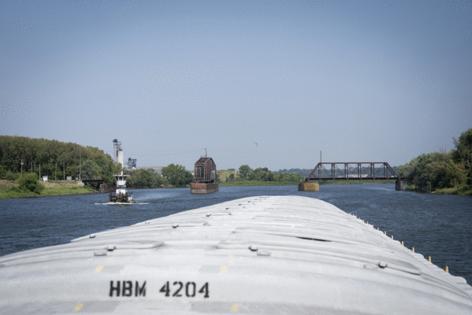Minnesota-based CHS steering through uncertain times for global agriculture
Published in Business News
After CHS leaders updated a room full of farmers on the state of corn, soy, wheat and fertilizer prices last week, one grower called out: “Do you have any good news?”
Commodity prices are distressed as a global supply glut far outpaces demand. Abundant harvests around the world have triggered declines in farm income and agribusiness profits, after record hauls during the pandemic.
The ups and downs of the global ag trade are part of life for farmers and cooperatives like Minnesota-based CHS. The industry has been here before, and the pendulum always swings back eventually, executives said.
But this down cycle comes amid particularly acute uncertainty.
Tariffs, if they come to pass, could hurt U.S. farm exports as they did in 2018. Wars and weather continue to be constant threats. Shifting regulations, in the U.S. and abroad, are adding complexity. And still, there is no new farm bill.
“I think the uncertainty is heavier because there’s such a diversity of things going on around the world,” said John Griffith, executive vice president for CHS’ ag business and CHS Hedging. “But we’ve been anticipating and seeing the downward cycle in ag for some time now.”
CHS — a $39 billion cooperative that buys, moves, processes and sells crops, fertilizer and oil — is coming off record years of profits, which could make for a softer landing as prices eventually bottom out.
“The cure for low prices is low prices” is the industry saying for the shifts in supply and demand that will eventually put ag on the upswing. Given past downturns, that could be a few years, however.
“Most agriculture companies are doing what we can to be efficient in these kinds of times, and that means we reduce expenses and take all the steps that we can given the commodity cycles,” CEO Jay Debertin said Thursday. “But you know what? Farmers are doing the same thing. Other people in the agricultural industry are doing the same thing.”
Last week, the cooperative’s annual meeting drew farmer-owners and co-op leaders from around the country to the Minneapolis Convention Center, decked out in blue and sporting the new CHS slogan: “It Takes a Co-op.”
“We had to navigate some change this year, didn’t we?” said CHS Board Chair Dan Schurr. “It takes a co-op, laser-focused on the producer, to make this work.”
CHS leaders talked on stages and in interviews about managing money and expectations — especially between here and Inauguration Day, when campaign promises might or might not turn to policy that affects the farm economy.
“We’re always making sure that we are positioning ourselves as best as we can in terms of our business, and we have a phenomenal government affairs team that works across the aisle with both political parties,” said Olivia Nelligan, chief growth and financial officer.
It’s not that spending has stopped completely; CHS is poised to close on a $225 million acquisition of a western Minnesota cooperative.
“We’ve developed a growth framework that we use to evaluate what’s the next best and highest use of every dollar to ensure that we’re investing in the best long-term interests of farmer-owners and member cooperatives,” Nelligan said.
Even as consumers keep spending, and there are few who are predicting a recession in the coming years, “the strength of the U.S. economy doesn’t really match the direction of the U.S. farm economy,” said economist Ty Kreitman at the Kansas City Fed. The outlook on farms hinges on “a balance of the labor market, consumption and productivity.”
The U.S. Department of Agriculture (USDA) predicts 2024 receipts for crops to drop 9% compared with 2023 because of lower payments for corn and soybeans. Even so, farm income remains above the 20-year average.
As of November, the USDA expects next year’s corn and pork exports to grow slightly but wheat and soy shipments to drop.
Debertin said global market access remains a key priority for CHS and the industry as competition remains fierce.
“Demand is good, but global supplies are plenty. And many times, either you need a catalyst on demand, or supply gets some challenges. And that’s the nature of agriculture,” he said. “We’ll come through the cycle, agriculture will come through the cycle. I can’t tell you how long it will last, but we will come through.”
©2024 The Minnesota Star Tribune. Visit at startribune.com. Distributed by Tribune Content Agency, LLC.












Comments